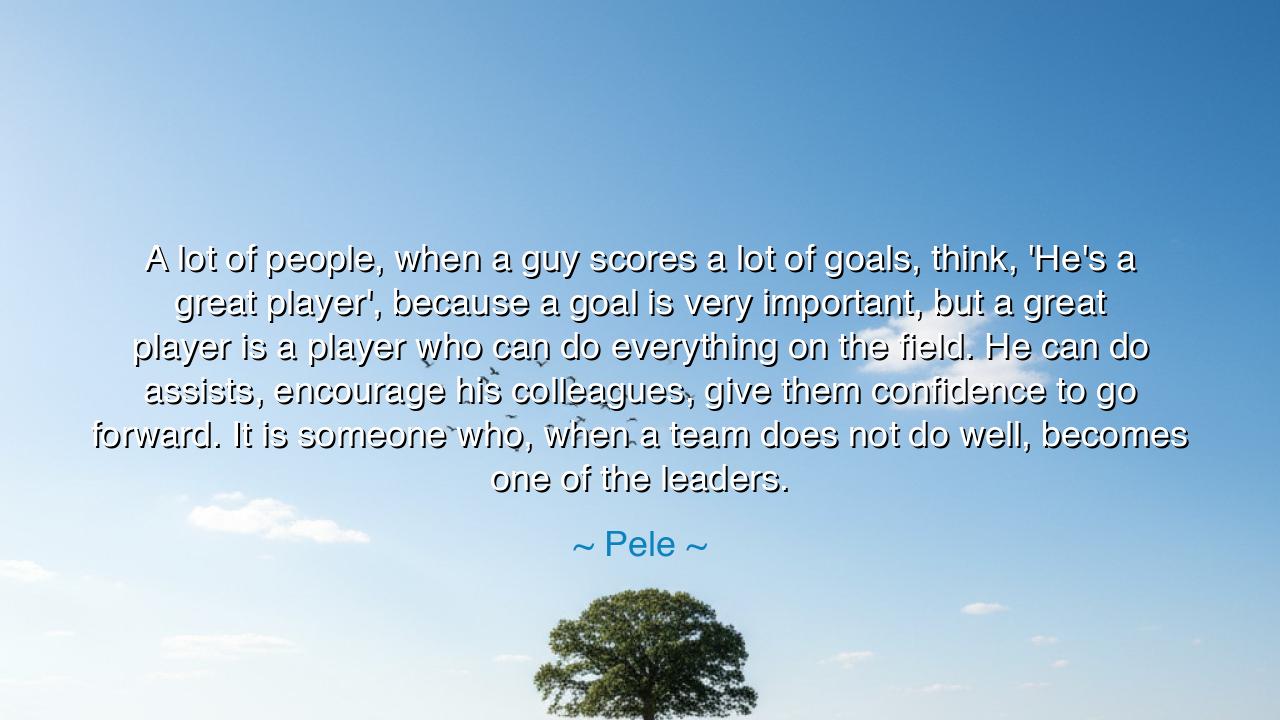
A lot of people, when a guy scores a lot of goals, think, 'He's a
A lot of people, when a guy scores a lot of goals, think, 'He's a great player', because a goal is very important, but a great player is a player who can do everything on the field. He can do assists, encourage his colleagues, give them confidence to go forward. It is someone who, when a team does not do well, becomes one of the leaders.






Hearken, O seekers of wisdom, and attend to the words of Pele, the immortal bearer of the beautiful game, who declares: “A lot of people, when a guy scores a lot of goals, think, 'He's a great player', because a goal is very important, but a great player is a player who can do everything on the field. He can do assists, encourage his colleagues, give them confidence to go forward. It is someone who, when a team does not do well, becomes one of the leaders.” At first, these words may appear as counsel for athletes alone, yet they echo across every field of human endeavor, revealing the true measure of greatness as holistic, selfless, and courageous. The ancients would have recognized this truth, for the valor of a warrior, the wisdom of a statesman, and the virtue of a philosopher were never judged by a single deed, but by the harmony of all actions in service to the whole.
Pele begins with the recognition that many mistake brilliance for achievement alone. To score, to strike decisively, to triumph in one moment is indeed visible and celebrated, yet it is only a fragment of the tapestry of excellence. The Greeks understood this well: Achilles, famed for his prowess, was not truly honored for the strikes of his spear alone, but for the way he inspired, defended, and led his comrades in the crucible of battle. Similarly, a player who scores many goals may dazzle the crowd, yet Pele insists that greatness is measured by contribution, leadership, and resilience.
The essence of this wisdom lies in the holistic nature of true skill. A great player engages in every aspect of the game: he assists, uplifts, and instills confidence in his companions. Just as a general does not command through individual feats alone but orchestrates the courage and abilities of the soldiers around him, so too does a great player weave unity and strength into the collective. History provides examples: in the Battle of Marathon, Miltiades did not fight only with valor, but with strategy, coordination, and encouragement, ensuring that every soldier’s effort contributed to the victory. Leadership is thus inseparable from competence and empathy.
Pele further emphasizes the power of encouragement and morale. In moments of despair, when the team falters and hope wanes, a true leader rises—not merely to perform, but to uplift others, giving confidence and direction. In the courts of kings, statesmen and advisors who could inspire courage and faith in troubled times were revered, for they understood that the strength of the many depends upon the resolve of the few who lead. Similarly, a great player’s impact transcends personal glory, creating an environment where excellence can flourish collectively.
The quote also teaches that true greatness is measured in adversity. It is not when all is easy, when victory comes naturally, that a player’s character is revealed, but in the crucible of challenge and loss. Consider Winston Churchill, whose leadership during the darkest hours of World War II was not defined by singular victories, but by the way he galvanized a nation, instilled courage, and reminded his people of their collective potential. So too, a great player shines most when the team struggles, guiding, motivating, and becoming a pillar of hope.
From this reflection emerges a timeless lesson: greatness is relational, not solitary. One must cultivate skills, yes, but also empathy, resilience, and leadership. The one who scores goals alone may be celebrated briefly, but the one who elevates others, who strengthens the whole, leaves a legacy that endures. In every endeavor—whether in business, art, governance, or sport—the measure of success is not only personal achievement but the empowerment of those around you.
Practically, let this wisdom guide your steps: refine your craft, but also nurture those who walk beside you. Encourage, support, and share knowledge freely. Step forward when others falter, not to claim glory alone, but to uplift the collective, to inspire confidence and courage. Seek balance in action: pursue excellence, yet cultivate leadership, empathy, and resilience as inseparable companions.
Thus, let it be known: greatness is holistic, selfless, and courageous, revealed not merely in moments of triumph, but in the capacity to elevate the many through skill, encouragement, and steadfast leadership. Walk upon your own field—whether of sport, work, or life—with mastery, heart, and the courage to lead, and you shall leave a legacy that endures beyond your individual deeds.






AAdministratorAdministrator
Welcome, honored guests. Please leave a comment, we will respond soon